Application of the matrix and competency diagrams
With the growth of the team, the team leader and senior management begin to think about the assessment of the competencies of employees. As part of this article, I want to talk about the first steps to implement employee assessment and what bonuses you can get.
A good tool is a competency matrix in conjunction with competency diagrams.
Let's start with the terminology.
Terms
The competency matrix is a table with data about the set of competencies of employees. In the cells of the table is a figure indicating the degree of competence of the competence.

A competency diagram is a petal diagram that visualizes the numerical indicators of employee competencies.
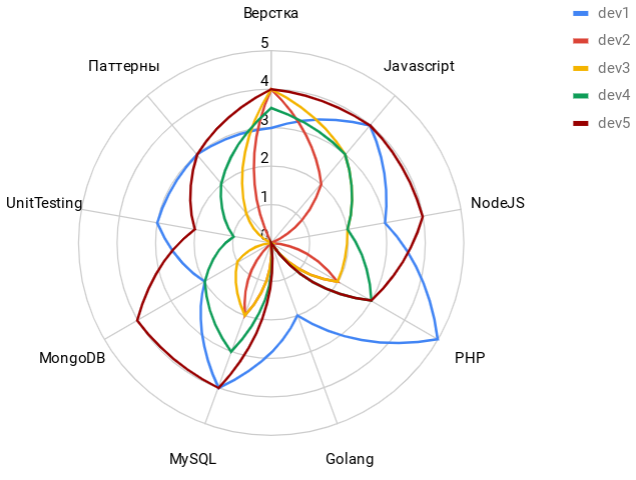
Classic approach
The competency matrix contains a list of skills that an employee must apply in his work. When developing the first matrix of competencies, I got about 200 competencies that need to be assessed. Collecting data about this amount of data is quite time consuming. Keeping them up to date is even harder. I could not force myself to use such a tool.
In this case, the matrix of competencies are widely used in many industries - from trade to industry. And they are used very successfully. It turned out that the number of skills in the competence matrix in other areas is about 20 or even less. Why not reduce the number of competencies in our field.
Begin implementation
It is worth starting small. And even the accuracy of the first steps we can sacrifice.
Plan:
- Select up to 20 competencies assessed. For example: programming languages, certain types of databases, self-testing, 1. patterns, etc.
- Collect data from employees. The employee independently determines the degree of ownership of technology on a scale from 1 to 5.
- Normalize the data. This makes the evaluator. Normalization will be subjective, but errors are permissible at the implementation stage.
- The resulting data is entered into a single matrix of competencies.
- Data collected from employees must be saved. It is very interesting to observe the change in employee self-esteem over time.
Data collection
Assessment of competences can and should be done during interviews and hiring employees. Additional assessments should be carried out in the course of work at least once every six months. This will track the dynamics of development.
It is necessary to add a number to the matrix, which reflects the employee's interest in the development of competence. Then you can select the right project for the employee and the dynamics of interest in various technologies from your employees.
According to the competence matrix of individual employees, it is easy to build a competence matrix of a company or an individual team.
It is very useful to build a project competency matrix.
Analysis
So you collected the data. It's time to get at least some benefit.
The resulting matrices provide such opportunities:
- See the bus factor.
- Determine the level of employee and growth points.
- Help to pick a team.
- They help to select a project and a team for each other.
Bus factor
Suppose you have 5 employees and you have the following matrix:

This matrix makes it possible to determine the bus factor.
On this matrix, you can see that it is hardly worthwhile to use Golang in the company. No one wants to be dependent on one single employee.

Let's take a look at the resulting competency chart. Bus factor is visible here. The same employee is a clear leader in knowledge of PHP. And it would seem good. After all, he can write any code. And this is true. He even managed to understand asynchronous PHP. But who then can support this code?
It is necessary to limit him in the application of non-standard approaches or to assign him the task of training such techniques of other employees. But it’s not worth going to asynchronous PHP.
Determining employee level and growth points
An employee of dev2 comes to you to demand a salary increase. You need to decide on the objectivity of its requirements. It is necessary to add to the matrix of abstract employees with competencies junior, middle frontend and middle backend.

On the matrix, it is immediately obvious that the employee’s level was completed. But to any of the midles, he clearly does not reach.
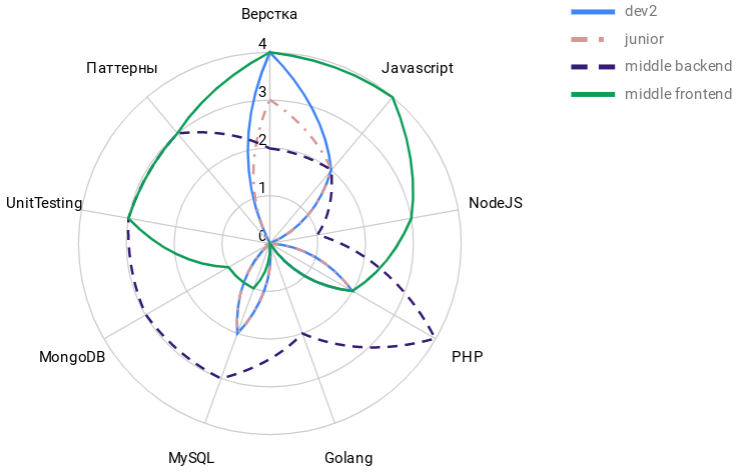
The diagram clearly shows that it is more logical for an employee to develop in the direction of the frontend and understand the directions that an employee needs to develop in order to get a promotion.
Team selection
Active exchange of knowledge occurs only in a team. For adequate communication in the team, the interests of the employees in the team should significantly intersect. It’s hard to imagine an active exchange of knowledge between pure backend and pure front-end, or mobile developer and sysadmin.
Task:
In the presence of 5 developers. Need to pick a team of 4 people on the project. At the same time it is necessary to ensure an active exchange of knowledge within the team.
Developers:
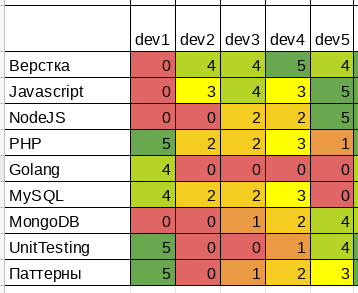
The matrix clearly shows a strong backender, 3 full steaks and a strong fender.
It’s hard to imagine an active exchange of knowledge between dev1 and the rest of the team. He has little overlap between knowledge and interests with the rest of the team. In the areas of intersection of knowledge dev1 far exceeds the rest in terms of knowledge. And it will be difficult for him to transfer knowledge to the rest of the team.
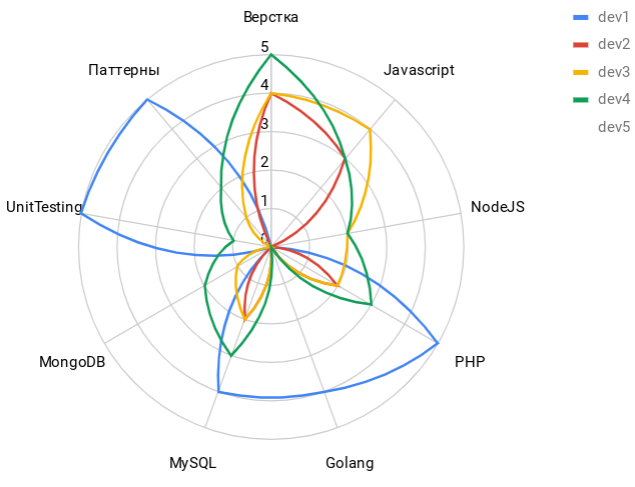
Dev1 with dev5 will have eternal disagreements on the subject of the most correct database.
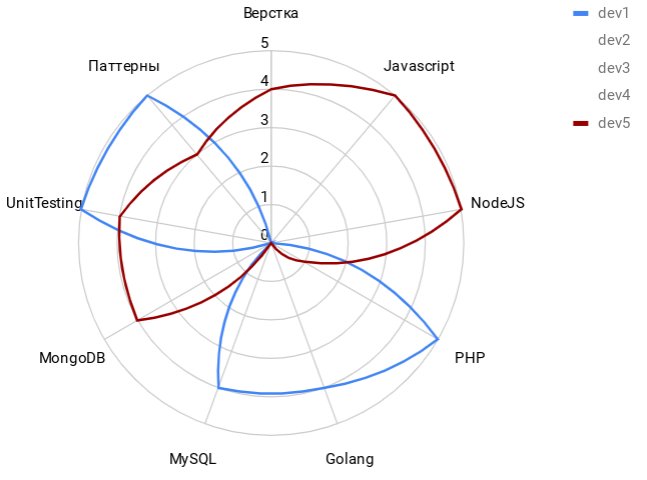
Just the same obvious distortions in the interests. Although there are coinciding, but they are clearly less than different.
However, I would prefer this team:
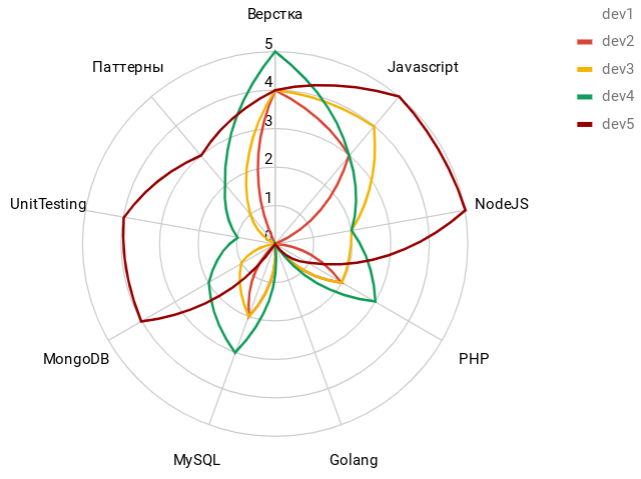
Growth points for each of the employees here are also obvious.
Similarly, you can select a project and a team for each other.
And these are only the simplest applications of a matrix and a competency diagram.
So the assessment of competence began to benefit the company. But the question arose in increasing accuracy? Only at this moment it is worth complicating the matrix. Even so, a large matrix should be reduced to a small matrix, and visualization should be done from a small matrix.
For convenient use of matrices, there will be little googlode. If you know this kind of tool write about it in the comments. And that and itch to hand bicycles.
PS This is a very simplified model. Timlid should know his team. The matrix and competency diagram is just one of the many tools of the team leader.
')
Source: https://habr.com/ru/post/443162/
All Articles